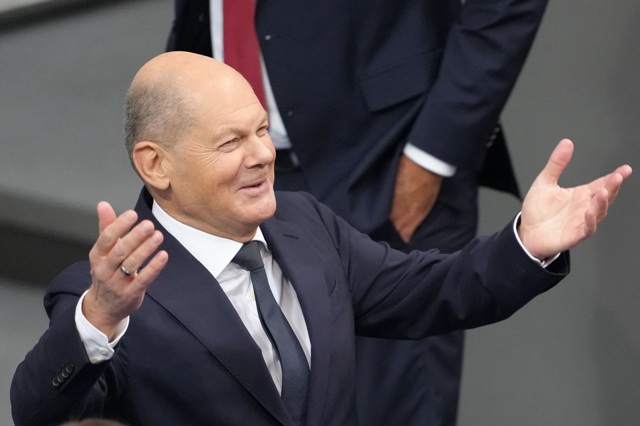By dpa correspondents I Sunday, December 01, 2024
BERLIN – Less than three months to go until Germany’s expected election, Chancellor Olaf Scholz came out swinging on Saturday, vowing to make his troubled Social Democrats (SPD) the strongest force in parliament.
“Now it’s about the big picture. If we take a wrong turn in Germany now, in this situation, it will have serious consequences,” Scholz told a campaign conference at the party’s Berlin headquarters.Let’s remember our strength: don’t complain, do it. Fight together,” Scholz said at the end of his hour-long speech, receiving long applause. “If we fight, we will win.”
Despite his upbeat stance, the SPD is currently lagging 16 to 22 percentage points behind the centre-right CDU/CSU opposition alliance in the polls.
The party is also still stinging from its humiliation in European Parliament elections in June, when the SPD saw their worst result in a nationwide election in more than 130 years at 13.9%.
Rebuilding after coalition collapse
Scholz’s government coalition collapsed after he fired ex-finance minister Christian Lindner of the pro-business Free Democrats (FDP) on November 6 following months of acrimony over budget plans for 2025.
The FDP withdrew, reducing the coalition to a minority government with the Greens. Scholz has announced a confidence vote in December, which is expected to pave the way for an early election on February 23.
Speaking to 500 SPD representatives on Saturday, Scholz said that security, cohesion, prosperity and jobs are at stake, stressing that now is the time to resolutely continue Germany’s renewal.
The SPD is fighting for reliable pensions, affordable rents, affordable healthcare and nursing care, said Scholz, who was unanimously nominated as candidate for chancellor by the party executive on Monday.
This followed a two-week debate on whether the highly popular Defence Minister Boris Pistorius should be put forward as a replacement candidate. Scholz’s candidacy still has to be confirmed at the party conference on January 11, although this is considered a formality.
“I know how to campaign. So some people will be quite surprised,” said Scholz.
Among his priorities, he also stressed the need to secure industrial jobs, especially in the hard-hit car industry; for cheap energy for the economy; increased investment in infrastructure; and combating the shortage of skilled labour.
No U-turn on migration
Meanwhile, Scholz accused the centre-right opposition of taking a regressive line on migration – a hot-button issue that may heavily influence the outcome of the election.
The CDU/CSU bloc is threatening to reverse current policy because it does not want to accept reality, he said. Germany has long been a country of immigration, he said, citing the country’s 25 million citizens who have a migrant background.
“And I want to tell you all today from the bottom of my heart that we belong together, as neighbours and colleagues, as schoolmates and friends from the sports club. We are all part of Germany,” said Scholz.
However, polls suggest that much support for the CDU/CSU may come from voters who, while being opposed to the current levels of immigration, are unwilling to vote for the far-right Alternative for Germany (AfD).
Disinformation efforts expected, say security agencies
Ahead of the election, Germany’s Federal Office for Information Security (BSI) said it is expecting various actors to attempt to sway the outcome by spreading disinformation.
“We definitely assume that there are groups that are interested in illegitimately influencing the elections,” BSI President Claudia Plattner told Deutschlandfunk radio on Saturday.
On Friday, the Federal Office for the Protection of the Constitution, the country’s domestic intelligence agency, warned of possible “actions of disinformation and discrediting, cyberattacks as well as espionage and sabotage,” by other states in the run-up to the vote.
Against the backdrop of its war in Ukraine, Russia is widely seen as having the greatest and most obvious interest in influencing the election in its favour.
